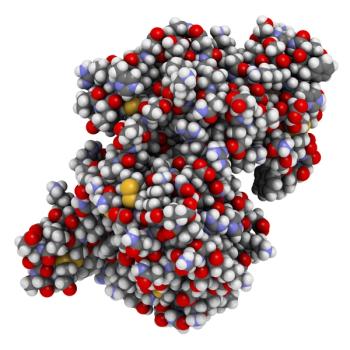
Patients with locally advanced or metastatic EGFR-mutant nonsquamous non–small cell lung cancer who progressed on an EGFR inhibitor may benefit from treatment with sintilimab plus bevacizumab biosimilar IBI305 and chemotherapy vs chemotherapy alone.

Your AI-Trained Oncology Knowledge Connection!


Patients with locally advanced or metastatic EGFR-mutant nonsquamous non–small cell lung cancer who progressed on an EGFR inhibitor may benefit from treatment with sintilimab plus bevacizumab biosimilar IBI305 and chemotherapy vs chemotherapy alone.

Investigators recommended that ddPCR testing and immunohistochemical staining be used to detect POLE status and p53/mismatch repair status, respectively, and allow for more rapid classification and risk-stratification.

Patients with endometrial cancer who have low volumetric skeletal muscle measurements had lower 3-year overall and progression-free survival rates.

Phase 2 data showed just over half of patients given dual therapy had a major pathological response, compared to just 6.7% of those receiving durvalumab monotherapy.

The new data may put to rest concerns that adding perioperative systemic therapy might worsen outcomes in patients slated for cytoreductive surgery and hyperthermic intraperitoneal chemotherapy.

Patients who underwent advanced molecular imaging had higher rates of disease-free survival, according to new research.

Most elderly patients with acute myeloid leukemia and myelodysplastic syndromes cannot undergo intensive chemotherapy, but more than half of the patients in a new study responded to a regimen of ultra low–dose decitabine and low-dose cytarabine with G-CSF.

New data show pain worsened faster, and more dramatically, in patients given placebo versus selinexor for dedifferentiated liposarcoma, as measured by the European Organisation for Research and Treatment of Cancer’s 30-item core quality of life questionnaire.

Patients with non–small cell lung cancer and PD-L1 tumor proportion scores of at least 50% had a median 5-year overall survival rate of 26.3%, showing a significant improvement versus standard of care.

Adding daratumumab led to at least a very good partial responses in all 41 patients receiving weekly carfilzomib, lenalidomide, and dexamethasone, and complete responses in all but 2 patients.

Recent guidelines have advised against routine use of sentinel lymph node biopsy and radiotherapy in patients over age 70 years with breast cancer, but a new study finds most patients still receive the interventions.

Patients treated in a multicenter trial experienced a median progression-free survival of 13.2 months with pembrolizumab versus 8.3 months in those receiving brentuximab vedotin.

Published: June 1st 2021 | Updated: